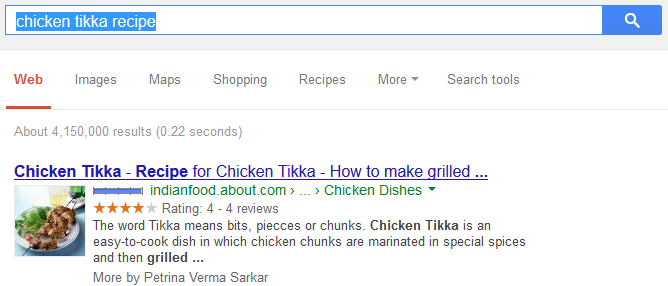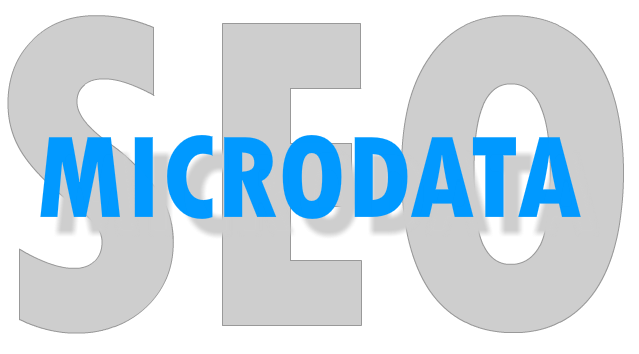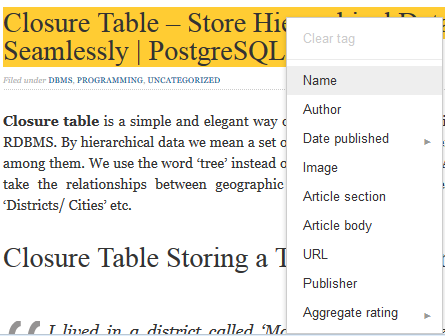I have seen many webmasters across the web asking about the ‘latest working SEO strategy of 2013’. Most of them end up with the traditional on page and off page SEO strategies like meta tags, descriptions, link building and so on. Yes, all of them still works and will improve your search engine ranking and increase your website traffic for sure. But, what if we try something entirely new and innovative ?
What is Microdata, Semantic Web and RDFa ?
So, my task here is to introduce you the concept of Microdata as simpler as possible. For that we begin with the term Semantic Web or Web 3.0
The major portion of the web today is composed of documents, written in Hyper Text Markup Language(HTML). We have something called Meta tags to describe the document or Web page as a whole. For the last couple of years, webmasters were busy with making their meta tags and descriptions search engine friendly!
<meta name="description" content="A list of books intended for
PostgreSQL programmers with review" />
<meta name="author" content="Tim joe" />
</head>
<body>
<div>
<h1>PostgreSQL Books</h1>
<h2>PostgreSQL 9.0 High Performance</h2>
<p>Reviewed by Tim joe on 8th February </p>
<p>This book is well written and very accurate,
from what I can tell, a tribute both to the author and the highly competent reviewers.
I doubt there is a single PostgreSQL user or developer who could not learn something
useful from this book
</p>
<p>This book is aimed at intermediate to advanced database
administrators using or planning to use PostgreSQL. Portions will also interest systems
administrators looking to build or monitor a PostgreSQL installation, as well as developers
interested in advanced database internals that impact application design.
</p>
<p>Rating: 4</p>
</div></pre>
</div>
<pre>
The meta tags given above describes a page containing reviews of different books on PostgreSQL. In the document, you might give each book title in <H2> tags , review in <P> tags and so on. Any user who read your page can clearly differentiate between each book and perceive them separately. But what about a search engine or any computerized system which crawl your page and index them and list them as a search result to user? It wont have any way to realize that this particular H2 tag is a title of a Book, or this P tag is the review for a particular book. All it have is that your page contains some information related to PostgreSQL. And it will somehow categorize your page based on keywords, description and contents.
-
Semantic Web

Semantic Web is all about adding more meta data to your page and giving meaning to each portion of your single page. A semantic web page allows you to embed information related to each portion of your page by providing a feature rich RDF(Resource Description Framework) data model
RDF is a wide topic by itself and we are not going to cover it here, instead we are gonna have a look at the RDFa(Resource Description Framework in Attributes).
-
The RDFa
The RDFa is a W3C recommendation which enable us to embed metadata to each HTML elements of our document and map it into the RDF data model. A simple example will help you better understand the concept:
<div xmlns:v="http://rdf.data-vocabulary.org/#" typeof="v:Review"> <h1>PostgreSQL Books</h1> <span property="v:itemreviewed"> <h2>PostgreSQL 9.0 High Performance</h2> </span> <p>Reviewed by <span property="v:reviewer">Tim joe</span> on <span property="v:dtreviewed" content="2013-02-08">8th February</span>. </p> <span property="v:summary"> <p>This book is well written and very accurate, from what I can tell, a tribute both to the author and the highly competent reviewers. I doubt there is a single PostgreSQL user or developer who could not learn something useful from this book </span> </p> <span property="v:description"> <p>This book is aimed at intermediate to advanced database administrators using or planning to use PostgreSQL. Portions will also interest systems administrators looking to build or monitor a PostgreSQL installation, as well as developers interested in advanced database internals that impact application design. </p> </span> <p>Rating: <span property="v:rating">4</span> </p> </div>In the similar manner we can mark up each review separately. This will help search engine spiders to derive the meaning of each part of your web page and find of the type of the data you are trying to convey.
-
Microdata
Microdata is yet another approach similar to RDFa, but even simpler, which allow us to nest metadata within our webpage contents. It allows the search engines and browsers to find the entities from our web page, rather than text. An entity represent something that exists by itself, such as a review, products, events, music, people etc. Here is our same old review example in Microdata format:
<div itemscope itemtype="http://data-vocabulary.org/Review"> <h1>PostgreSQL Books</h1> <span itemprop="itemreviewed"> <h2>PostgreSQL 9.0 High Performance</h2> </span> <p>Reviewed by <span itemprop="reviewer">Tim joe</span> on <time itemprop="dtreviewed" datetime="2013-02-08">8th February</time>. </p> <span itemprop="summary"> <p>This book is well written and very accurate, from what I can tell, a tribute both to the author and the highly competent reviewers. I doubt there is a single PostgreSQL user or developer who could not learn something useful from this book </p> </span> <span itemprop="description"> <p>This book is aimed at intermediate to advanced database administrators using or planning to use PostgreSQL. Portions will also interest systems administrators looking to build or monitor a PostgreSQL installation, as well as developers interested in advanced database internals that impact a pplication design. </p> </span> <p>Rating: <span itemprop="rating">4</span></p> </div> </div>User can even nest entities within entities and provide a hierarchical structured meta data. Microdata vocabularies provide the meaning of an entity or item. The web site schema.org, an initiative launched by Google, Yahoo and Bing provides vocabulary/schema for commonly used items namely: Organization, Product, Person, Event, Review, Review-aggregate, Breadcrumb, Offer, Offer-aggregate. Users can even define their on Vocabularies/Schema but major search engines can only understand the vocabularies/schema defined by schema.org. Google uses Microdata for various purposes including forming Rich Snippet in Google search results.
3 Reasons why Microdata is Important in SEO
So far we discussed about the concept of Microdata and similar technologies; Now, let us come to the core of our discussion, why Microdata is important in SEO ? And how meta data improves your search engine position and raking ?
These are the 3 reasons because of which I believe Microdata is important in SEO:
-
The Web 3.0(Semantic Web) and Google’s New Humming Bird Algorithm
 The Web 3.0 or Semantic Web is moving forward with the aim of making a more meaningful web which will relate everything on the web by ‘meaning’ rather than raw ‘ textual data’. Obviously, all search engines are also moving towards semantic search rather than word matching. The main feature of Google Humming Bird Algorithm is nothing but the semantic search. It includes finding meaning behind the words and providing the results which contain the entity derived from the meaning of the query. So searching for ‘chicken tikka recipe’ would give a result which contain pages with ‘recipe microdata’ embedded first. If you have a better recipe than one listed first, but you don’t have the microdata, then the probability of your site appearing first is very less!
The Web 3.0 or Semantic Web is moving forward with the aim of making a more meaningful web which will relate everything on the web by ‘meaning’ rather than raw ‘ textual data’. Obviously, all search engines are also moving towards semantic search rather than word matching. The main feature of Google Humming Bird Algorithm is nothing but the semantic search. It includes finding meaning behind the words and providing the results which contain the entity derived from the meaning of the query. So searching for ‘chicken tikka recipe’ would give a result which contain pages with ‘recipe microdata’ embedded first. If you have a better recipe than one listed first, but you don’t have the microdata, then the probability of your site appearing first is very less!

-
The Structured Data Testing Tool, Structured Data Markup Helper and Rich Snippet
Google recently introduced two new tools as part of Web Master Tools – The Structured Data Testing Tool and Structured Data Markup Helper. The Structured Data Markup Helper is used to highlight the structured markups in a web page. By simply highlighting and tagging, it will teach Google about the elements of your website which are part of the Structured data. In other terms Google use the data provided by you to build microdata for your page. You can test your page to verify microdata entities using The Structured Data Testing Tool. Later, Google will use the microdata to form Rich Snippet for your page.
Google’s introduction of Structured Data Testing Tool and Structured Data Markup Helper clearly indicates that it is taking microdata seriously. Microdata, for sure, is gonna play a key role in the next generation search engine optimization and it is very much important in shaping your search engine visibility and traffic.
Learn how to add Breadcrumb Microdata to your WordPress blog:
How to Add Breadcrumb Microdata in Wordpress [Tutorial]
-
Google Authorship
The Google Authorship enables you to link your Google+ profile to the content or webpage owned by you. A link to your Google+ profile and a thumbnail of the profile picture will directly come in search result. In fact Google Authorship is a microdata People entity with a social connection in it.
So, Google has taken steps to redefine your search engine visibility and position by using your social connections and reputations, with microdata as its back born.
-
The Early Bird Advantage
 Microdata, Structured Data, Rich Snippet – all such words are just begin to catch attention of webmaster for the lasts few months only. The majority of the webmasters are still unaware of the existence of such concepts or often reluctant to try it out.
Microdata, Structured Data, Rich Snippet – all such words are just begin to catch attention of webmaster for the lasts few months only. The majority of the webmasters are still unaware of the existence of such concepts or often reluctant to try it out.So, taking advantage of this situation, and being a master of these technologies is really gonna help you build a strong base in the new era of search engine optimization!





5 comments
Magnificent beat ! I would like to apprentice at the same time as you amend your web site, how can i subscribe for a weblog site?
The account helped me a appropriate deal. I were tiny bit familiar
of this your broadcast provided brilliant transparent concept
Its not my first time to pay a visit this site, i am browsing this site dailly and get good data from here every day.
Wow! This blog looks exactly like my old one! It’s on a entirely different topic but it has pretty much the same page layout and design.
Great choice of colors!
so you finally got the adsense, i show your comment on a forum for adsense application just before i visited your website. Goodluck for your site.
Yes, finally I got it approved before two months!